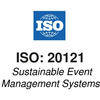
ISO20121
About (ISO20121)
ISO 20121 is an international standard that sets out guidelines for implementing and managing sustainable event management systems. It provides a framework for event organizers to integrate sustainability principles and practices into their event planning, execution, and post-event activities.
The ISO 20121 standard is applicable to all types and sizes of events, including conferences, exhibitions, concerts, sporting events, and festivals. It encourages event organizers to consider the social, environmental, and economic impacts of their events and take proactive measures to minimize negative effects and maximize positive contributions.
Key elements of ISO 20121 include:
Sustainability Policy: Event organizers are encouraged to develop a sustainability policy that outlines their commitment to sustainable event management and sets objectives and targets for improvement.
Stakeholder Engagement: ISO 20121 emphasizes the importance of engaging with relevant stakeholders, including event participants, local communities, suppliers, and regulatory bodies, to gather input, address concerns, and foster collaboration.
Planning and Integration: The standard guides event organizers in integrating sustainability considerations into all stages of event planning and execution. This includes assessing the environmental and social impacts of event activities, setting targets for improvement, and developing action plans to achieve sustainability objectives.
Supply Chain Management: ISO 20121 encourages event organizers to work with suppliers and contractors who share their commitment to sustainability. It promotes the use of environmentally friendly products, services, and practices throughout the event supply chain.
Waste Management: The standard highlights the importance of minimizing waste generation, promoting recycling and reuse, and adopting responsible waste management practices during and after the event.
Energy and Water Conservation: ISO 20121 encourages event organizers to implement measures to reduce energy and water consumption, promote energy-efficient technologies, and explore renewable energy sources for event operations.
Communication and Reporting: Event organizers are encouraged to communicate their sustainability efforts to stakeholders and the public. This includes providing information on sustainable practices, achievements, and ongoing improvement initiatives.
By implementing ISO 20121, event organizers can enhance the sustainability performance of their events, minimize negative impacts on the environment and local communities, and create a positive legacy. The standard provides a systematic approach to sustainable event management, helping organizers identify opportunities for improvement, engage stakeholders, and demonstrate their commitment to sustainability.
In summary, ISO 20121 is an international standard that provides guidelines for implementing sustainable event management systems. It enables event organizers to integrate sustainability principles into all aspects of event planning, execution, and post-event activities. By following the standard, event organizers can reduce environmental impacts, engage stakeholders, and contribute to the overall sustainability of the event industry.